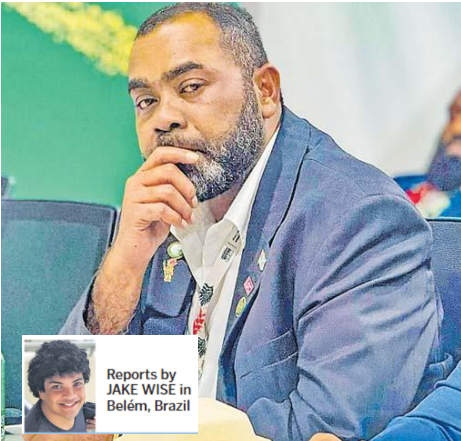MINISTER for Environment and Climate Change, Mosese Bulitavu, has launched Fiji’s first national Sustainable Finance Roadmap.
Mr Bulitavu said this was a plan that would unite the country’s entire financial system, including the Ministry of Environment and Climate Change, the Reserve Bank of Fiji, local banks, insurance companies, and development partners such as the UN Environment Program, to work together to fund projects for the environment, fight climate change and support people and businesses. Speaking at the launch, Mr Bulitavu described the initiative as a critical step for Fiji amid growing global challenges related to climate change, economic vulnerabilities, and social inequalities.
“This roadmap represents a shared vision between the Ministry, the Reserve Bank, and our development partners to ensure that our financial system supports a more sustainable, inclusive, and climate-resilient Fiji,” he said.
He said climate change is already affecting every sector of Fiji’s economy, from agriculture and tourism to infrastructure and livelihoods.
“It is here! It is real! And it affects every sector of our economy.”
The roadmap provides a framework for transforming Fiji’s financial sector so that every dollar invested contributes to a more environmentally friendly and climate-resilient future. It focuses on building trust in financial institutions, directing money toward sustainable projects like green bonds and climate insurance, and making sure everyone, including women, youth, and people with disabilities, can access financial tools to cope with climate change.
“This roadmap is not just a technical document; it is a call for action.
“I want to acknowledge the support of the NDC Partnership, UNEP, the Reserve Bank of Fiji, government stakeholders, the private sector, and development partners.”
He said sustainable finance was central to Fiji’s long-term prosperity.
“Every policy we adopt, every dollar we invest, and every partnership we build must bring us closer to a future where our people, our environment, and our economy can thrive together.”
‘Finance must reach the grassroots’
ACTING Director for Women Amelia Nairoba is calling for easier climate finance processes to ensure women, marginalised groups and grassroots communities in Fiji and the wider Pacific receive direct
benefits.
Speaking to this newspaper, Ms Nairoba discussed the importance of ensuring that climate finance reaches vulnerable populations, including women and children, youths, persons living with disabilities, and rural communities.
“This priority is part of the broader Gender Action Plan, which identifies five key areas: capacity building, gender balance and leadership, gender responsive implementation, access to finance, and monitoring and reporting,” she said
“We are working to ensure that developed countries support simplified climate finance programs for grassroots and vulnerable communities, including women-led organisations and rural communities.”
Ms Nairoba noted that capacity building is also a major focus, aiming to strengthen the skills and knowledge of government officials, national gender focal points, and climate change focal points across
the region.
She stressed the need for agreed language on gender, noting that gender mainstreaming remains essential, though some countries have shown regressions in recognising its importance.
“We have ongoing support from international partners, including the UK, EU, and Australia, and we want to include men and boys as allies in climate adaptation, mitigation, and loss and damage efforts.”
Negotiations on gender priorities are still underway, with discussions on the metrics and implementation of the gender action plan extended into this week.
Ms Nairoba expressed optimism that these talks will result in positive outcomes for vulnerable communities and the effective implementation of the LIMA framework.
EU shows support
THE European Union is not opposing climate-transition obligations in international negotiations and is, instead, supporting the concerns raised by small island states.
This was according to the ministry’s permanent secretary for Environment and Climate Change, Dr Sivendra Michael, who clarified the EU’s position following claims that European representatives were resisting climate-transition requirements that could impose new obligations on businesses across Europe.
He said the bloc had shown no signs of opposing elements linked to Nationally Determined Contributions (NDCs) or broader transition commitments.
“The European Union is one that is fully acquainted with the ruling,” he said.
“They are also aware of the elements of the ruling that are very important for the private sector and so forth.”
He added that, based on the discussions, the EU appeared to be working on policies that support the transition rather than block it.
“I don’t see that in the room from the EU, where they are actually objecting to anything around the NDC response. When in fact they are more forthcoming towards alignment.”
Dr Michael noted that during a ministerial segment led by Norway’s minister and the European Commission, European officials acknowledged the challenges and economic costs of transitioning away from fossil fuels.
“They also talked about the hard truth on how to phase out possibilities, given that the transition pathways are going to be very costly for some economies rather than others.”
He said the EU’s approach suggests it is considering the transition “from a collective angle”, recognising the disproportionate burden faced by smaller and more vulnerable countries.



